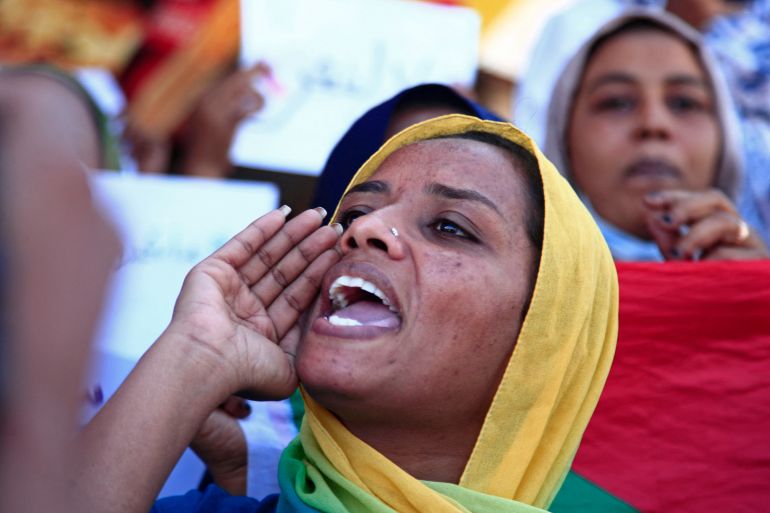Women speak out about sexual violence in Sudan fighting
Rapes by fighters are being documented in Sudan as doctors and individuals band together to support the victims.

Multiple accounts of rape perpetrated by the paramilitary Rapid Support Forces (RSF) have emerged across Sudan – as well as one documented case of a rape by an army soldier – as activists and medical professionals take to social media to warn others and provide a critical support network for survivors and women at risk of sexual violence.
Graphic details have been shared online as organisations and individuals grapple with internet connectivity issues to paint a disturbing picture of increasingly indiscriminate attacks on women as the war enters its fifth week.
Sudanese capital Khartoum and el-Geneina in West Darfur are said to be suffering the highest cases of sexual violence.
“There are confirmed reports that about 24 women and girls were kidnapped and raped from Otash IDP camp in South Darfur last month,” said Neimat Abubaker Abas, a senior programme adviser at Strategic Initiative for Women in the Horn of Africa (SIHA).
Abas added that they have been able to verify 30 cases of rape in South Khartoum.
She said that refugees and internally displaced women have been particularly targeted. There have been six cases of refugee women having been raped since the outbreak of the conflict, according to SIHA.
A gynecologist friend tells me that among their medical networks they are being sent messages about rape incidents& requests for emergency contraceptives.
One incident she said was a girl asking for help for ‘2 daughters raped in front of their mother’.#KeepEyesonSudan#Sudan
— Nada. (@NadaWanni) May 15, 2023
Not all reports have been independently verified, but they suggest a broad pattern of behaviour in which women are being routinely targeted, in some cases in front of family members, and subjected to brutal acts of sexual violence.
According to Al Jazeera’s sources, who work directly with victims but wish to remain anonymous, foreign women were targeted initially, but attacks on Sudanese women are now widespread.
Activists decry attacks as informal civilian networks offer support
Since the outbreak of war on April 15, civilian networks have rallied behind the most vulnerable, offering vital logistical information regarding checkpoints, escape routes, and sourcing and purchasing emergency medical supplies that are in desperately short supply.
In response to the reports of sexual violence, many women have taken to social media to report incidents. At the same time, medical professionals and psychologists have offered advice and support to those affected, including numbers where survivors can receive urgent treatment based on their location.
This brings the number of confirmed cases known to "Hadhreen" to Ten cases..
In addition to the two remaining cases, which are being verified, we received a report of two new sexual assault cases yesterday, (Sunday 14th of May) in the city of Khartoum and Khartoum..
— Hadhreen | حاضرين (@Hadhreen_org) May 15, 2023
The UN said (PDF): “There are critical shortages of supplies for the clinical management of rape and dignity kits, as the stocks are inaccessible.”
Amira*, a young woman from Nyala in South Darfur, told Al Jazeera that women are hiding indoors as reports of rape circulate. However, poor internet and phone connectivity have hampered communications.
“We try to share info of pharmacies and clinics that can provide help for rape victims, but again, that’s patchy as we rely on WhatsApp groups and contacts to give us the info,” she said.
“Nyala is generally safer [but] el-Geneina is a horror story. What’s happening, there is far worse with the looting, kidnapping, continuous fighting and clashes and rape cases,” Amira said.
Garden city – the residential area parallel to Burri and straddling Nile street – has been ransacked by RSF and hit by multiple missiles this week.
One house guard says RSF guys showed up armed to the teeth asking for safes and women.
— Yousra Elbagir (@YousraElbagir) May 14, 2023
A history of sexual violence
Security forces have committed acts of sexual violence in Sudan before.
In 2019, reports emerged of the RSF and other troops raping dozens of women after they tore apart a sit-in camp in Khartoum, where protesters had been demanding for weeks that the military give up power.
The UN has said rape was used as a weapon of war in Darfur when fighting began in 2003 as mostly non-Arab rebel groups rose against the central Sudanese government, decrying the historical neglect that their region had suffered and the continuing exploitation of their resources by Khartoum elites.
“This isn’t new to us here in Darfur; we’ve experienced and been through this before,” Amira said.
In October 2014, 221 women and girls in North Darfur were mass raped, in many cases in front of loved ones, by Sudanese army forces in their homes and on the streets.
* Name has been changed to protect the identity of the individual.